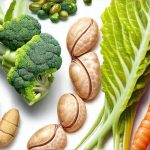The urinary system, encompassing the kidneys, ureters, bladder, and urethra, is constantly exposed to metabolic byproducts and potential toxins as it filters waste from the body. This inherent function, while vital for overall health, makes these tissues particularly vulnerable to oxidative stress – an imbalance between free radical production and the body’s ability to neutralize them. Chronic oxidative stress can lead to inflammation, cellular damage, and ultimately, various urinary tract disorders. While conventional treatments are available, growing research highlights the protective role of natural antioxidants in supporting urinary tissue health. These compounds, found abundantly in our diet and readily accessible through lifestyle choices, offer a proactive approach towards mitigating oxidative damage and promoting long-term wellbeing within the urinary system.
Understanding that prevention is often more effective than cure, exploring the potential of naturally occurring antioxidants to bolster the resilience of urinary tissues is increasingly important. Antioxidants work by neutralizing free radicals—unstable molecules that can damage cells—thereby reducing inflammation and supporting cellular function. It’s crucial to remember that a holistic approach incorporating a balanced diet rich in antioxidant-rich foods, adequate hydration, and healthy lifestyle choices are key components of a strong defense against urinary tract issues. This article will delve into specific natural antioxidants known for their potential benefits to urinary health, exploring how they work and where to find them. Maintaining a healthy system also relies on adopting beneficial daily habits for urinary tract health.
Dietary Sources & Mechanisms of Action
Many fruits and vegetables boast impressive antioxidant profiles. Berries, particularly blueberries, cranberries, and raspberries, are rich in anthocyanins, powerful compounds linked to reduced inflammation and improved bladder function. Similarly, dark leafy greens like spinach and kale contain significant amounts of vitamins C and E, both potent antioxidants that protect cells from damage. Citrus fruits offer a generous dose of vitamin C, while tomatoes provide lycopene—another effective antioxidant with potential benefits for prostate health, which indirectly impacts urinary function in men. Beyond individual nutrients, polyphenols found in green tea and cocoa have also demonstrated promising protective effects against oxidative stress within the urinary system.
The mechanisms by which these antioxidants protect urinary tissues are multifaceted. They directly neutralize free radicals, preventing them from damaging cellular structures like DNA and proteins. This reduces inflammation, a common underlying factor in many urinary tract disorders. Furthermore, certain antioxidants can enhance the body’s own natural antioxidant defenses, such as glutathione peroxidase and superoxide dismutase, bolstering the overall capacity to combat oxidative stress. It is important to note that bioavailability – how well the body absorbs and utilizes these compounds – varies depending on the source and individual factors like gut health.
Consuming a diverse range of antioxidant-rich foods isn’t just about preventing damage; it’s about supporting cellular repair and regeneration. Antioxidants can help maintain the integrity of the urinary tract lining, reducing permeability and minimizing irritation. This is particularly relevant in conditions like interstitial cystitis, where inflammation and increased bladder sensitivity are prominent features. A well-nourished urinary system is better equipped to handle metabolic stress and maintain its crucial filtering functions. Consider incorporating natural foods that soothe urinary discomfort into your diet.
Specific Antioxidant Compounds & Their Roles
Curcumin, found in turmeric, is a potent anti-inflammatory and antioxidant compound gaining significant attention for its potential health benefits. Studies suggest curcumin may help reduce inflammation within the bladder, potentially alleviating symptoms associated with conditions like cystitis and overactive bladder. Its lipid solubility allows it to readily integrate into cell membranes, providing robust protection against oxidative damage. However, curcumin’s bioavailability is relatively low; combining it with piperine (found in black pepper) can significantly enhance absorption.
Resveratrol, found abundantly in grapes and red wine, is another powerful antioxidant known for its ability to combat inflammation and protect against cellular damage. Resveratrol has been shown to reduce oxidative stress in kidney cells, potentially mitigating the progression of chronic kidney disease. It also exhibits anti-fibrotic properties, which could help prevent scarring and maintain optimal kidney function. Like curcumin, resveratrol’s bioavailability can be improved through strategic combination with other compounds.
Quercetin, a flavonoid found in onions, apples, and berries, possesses both antioxidant and anti-inflammatory properties. Research indicates quercetin may help strengthen bladder walls and reduce urinary frequency – common symptoms of an overactive bladder. It also exhibits diuretic effects, promoting healthy urine flow and potentially flushing out toxins. Quercetin’s ability to inhibit histamine release further contributes to its potential benefits for individuals experiencing allergy-related urinary issues. Supporting this with a focus on natural diuretics for urinary cleanse can be beneficial.
Hydration & Antioxidant Synergy
Adequate hydration is fundamental to urinary health and plays a vital role in antioxidant efficacy. Water acts as a solvent, facilitating the transport of antioxidants throughout the body and helping flush out metabolic waste products that contribute to oxidative stress. Dehydration concentrates urine, increasing its acidity and potentially irritating the bladder lining. Aiming for 8-10 glasses of water daily is generally recommended, but individual needs may vary based on activity level and climate.
Synergistic effects between different antioxidants are also noteworthy. Combining vitamin C with other antioxidants like vitamin E can enhance their protective capabilities. Similarly, pairing curcumin with piperine significantly boosts its bioavailability. A diverse diet naturally provides this synergistic benefit, ensuring a broader spectrum of protection against oxidative stress. This highlights the importance of dietary diversity rather than relying solely on individual antioxidant supplements. Consider how foods that naturally alkalize the urinary tract can contribute to this balance.
Lifestyle Factors & Antioxidant Absorption
Beyond diet and hydration, several lifestyle factors can influence antioxidant absorption and utilization. Chronic stress increases free radical production, negating some of the benefits of antioxidant intake. Practicing stress-reducing techniques like meditation, yoga, or spending time in nature can help mitigate this effect. Regular exercise improves circulation, enhancing the delivery of antioxidants to tissues throughout the body. However, excessive intense exercise can also temporarily increase oxidative stress; therefore, balance is key.
Smoking and excessive alcohol consumption significantly deplete antioxidant reserves and contribute to oxidative damage within the urinary system. Avoiding these habits is crucial for maintaining optimal urinary health. Furthermore, gut health plays a vital role in nutrient absorption. A healthy gut microbiome enhances the bioavailability of antioxidants, while imbalances can hinder their effectiveness. Supporting gut health through probiotic-rich foods or supplements can further amplify antioxidant benefits. Incorporating natural prebiotic meals is a great starting point.
It’s important to reiterate that this information is for general knowledge and educational purposes only, and does not constitute medical advice. Always consult with a qualified healthcare professional before making any changes to your diet or lifestyle, especially if you have pre-existing health conditions or are taking medications.





















